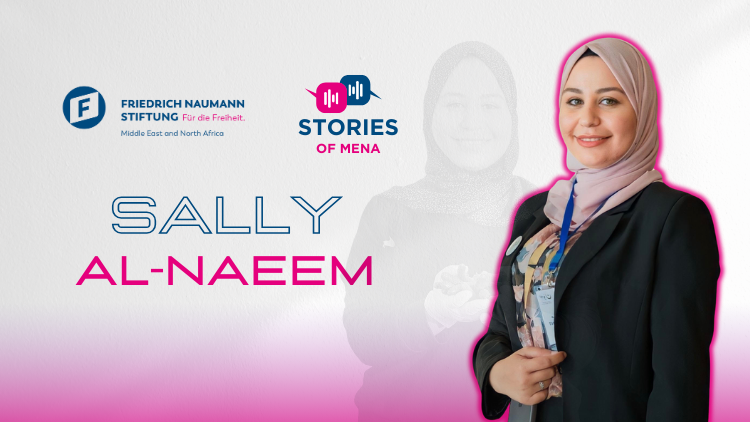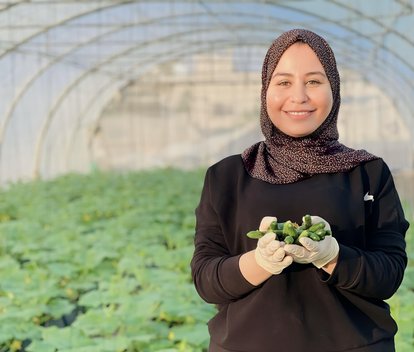Stories of MENA
Stories of MENA: Sally Al-Naeem

In the remote dry lowland region of Deir Alla in Jordan, blooms, despite harsh climate conditions, increasing weather fluctuations and severe drought, a fertile oasis of fiery greenery and high expectations. Sally Al-Naeem is the 29 years old managing director and vibrant mastermind behind an avant-garde agronomic project labeled Green space that promotes “smart farming”.
Having majored in management information systems and roamed among several positions at various non-governmental organizations, mainly as coordinator of training programs related to economic development and sustainable energy, she gets to a breaking point. “Stop! I have to remove my chains as a contracted employee and think of myself.” But instead, she thinks of … the farmers in Deir Alla!!
A thorough research depicting major problems taking grip over Deir Alla led Sally into the thick of community entrepreneurship. “I found that Deir Alla holds a special position in Jordan’s food basket and that agriculture is the largest sector in which the residents of my region work, though a big range of impediments and challenges prevent the farmers from making acceptable profits whatever the hard striving they undertake.” She realized that a vicious circle is taking over the agrarian sector: the climate is affecting water resources that are decreasing noticeably and therefore causing the crops to lessen in quality and quantity, thus impoverishing the farmers and diminishing the volume of Jordanian food supplies and exports. She came up with the idea of implementing hydroponics as a way out. Her project aims at preserving the agricultural heritage but, moreover, to improve the local farmers’ resource management skills so to ensure proper sustainable incomes for them and food security for Jordan.
Three years ago, what was a random idea turned into a pondered proposal, concretized into a registered institution endorsing a most advanced agronomic technology. Green Space became a reliable learning address for farmers desiring to counter water and climate obstacles, to enhance their productions quality and quantities, and consequently, to increase their financial benefits and multiply their contribution to the Jordanian economy. “I had to resort to an entrepreneurial mindset in order to make a difference vis-à-vis the deeply rooted traditions of farming and the very hot summers (50 to 60 degrees Celcius) that prevent any farming during several months.” Sally puts up a chilling system that allows growing fruit and vegetables all year around. She offers free trainings for farmers to learn the hydroponic techniques that enable them to cultivate additional areas for extended times, and therefore prevent them from abandoning their land uncultivated and even migrate, and join the ever-growing ranks of unemployed people. “This project saves 80% of water consumption. It consists of planting in tanks filled with water and nutrients. It provides good quality crops that are sold at better prices.”

Sally dealt not only with economic difficulties but with social ones as well. In a so much conservative society as hers, a young woman, neither poor nor a widow, working in a farm as a manager, is not even conceivable. The first person to stand against her endeavor was her uncle: “Your place is not in a plastic tent. It is at a sink. Go find yourself a husband.” Sally did not reply with words but with … success. “He and I were growing cucumbers at that time. He sold the box at 15 piasters while I sold the kilogram at one and a half dinar. He then came to me and asked me how I did it. Moreover, he requested to rent one of my plastic tents!”
Sally built up a relation of confidence with men – including farmers - by proving to them that her abilities are genuine, her achievements obvious, and her desire to help them authentic. “Such relationships do not rely on narrow interests. They are more of an investment on the long run for the best profit of my community” … and of other regions, as Sally became a reference for farmers and entrepreneurs reaching out to her for advice and mentorship. “Today, I am not picking fruits and vegetables. I am harvesting another kind of crops: success! And my ambition is that, in ten years, I would have become the most prominent farmer, teaching other farmers to grow up as well.”
People came to address Sally as “Sheika”, meaning wise, prominent and helpful woman. “I believe that the good I do today will come back to me on another day!” She admits that she used to be a very weak and extremely fearful person. She attributes her newly acquired strength and success to her deceased father. “My father, may God rest his soul, had a different way of thinking compared to other traditional men. He wanted his daughters, not only to get married, but also to get an education, to follow their own paths in life, to depend on themselves, to achieve success. He encouraged me to think out of the box.” Sally emphasizes the fact that she inherited her deep love of agriculture and her acute sense of responsibility from him. Though profoundly affected by the loss of her father, she overcame her sorrow by sticking to his teachings and by striving to fulfil his expectations. “I worked by day and studied by night with the sole aims of obtaining an academic certificate and of taking care of my siblings, though being the youngest. I graduated with honors and helped my brothers financially, as they have relatively low-income jobs.”
Named after a 1990s cartoon heroin, resilient and proactive though mishandled by fate, Sally, as her fictional doppelganger, wrote her own success story because she does not want to fail her father, even in his absence. “When we will meet again, I will tell him: the seeds you planted in my mind and soul have bloomed. I am now cropping their fruits.”